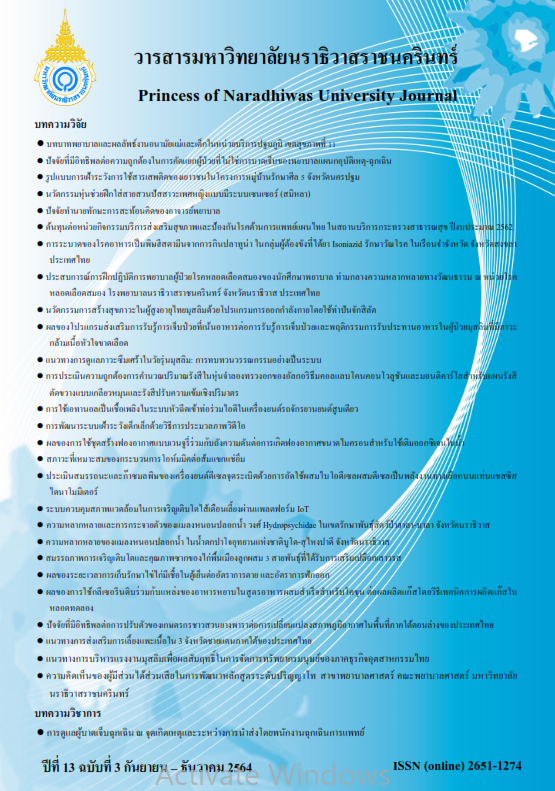Guidelines for Muslim Labor Management for Achievement of Human Resource Management in Thai Industrial Business Sector
Keywords:
Structural equation model, Muslim labor management, industrial businessAbstract
This qualitative and quantity research aimed to study guidelines for management and developing structural equation model of Muslim labor management in Thai industrial business sector. The data were collected with number of 500 from those who responsible for human resource management in small and medium industrial businesses in the three southern border provinces.
The study revealed that the guidelines for Muslim labor management for the achievement of human resource management in Thai industrial business sector, gaining the highest mean score in the aspects related to religion support, human resource management, working system, and motivation and welfare were providing food in accordance with Halal principles, adjusting salary base to meet the current economic condition, installing emergency system such as fire extinguishing and alarm systems for workers’ safety, and providing risk compensation for operations that are at risk or work in risk areas respectively. Regarding the hypothesis test, it was found that both small and medium industrial businesses gave no different importance on the guidelines for Muslim labor management for the achievement of human resource management in Thai industrial business sector at the statistical significance level of .05.
The analysis of the developed structural equation model showed that it passed the assessment criteria and was consistent with the empirical data. Its values of Chi-square probability level (CMIN-p), relative Chi-square (CMIN/DF), goodness of fit index (GFI), and Root Mean Square error of approximation (RMSEA) were .064, 1.147, .956, and .017, respectively. The motivation and welfare composition directly influence the religious support composition. The composition of the working system directly influence the human resource management composition, the composition of motivation and welfare have a directly on working system composition.
References
Aburumman, O., Salleh, A., Omar, K., & Abadi, M. (2020). The impact of human resource management practices and career satisfaction on employee's turn-over intention. Management Science Letters, 10(3), 641-652.
Abuza, Z. (2011). The Ongoing Insurgency in Southern Thailand: Trends in Violence, Counterinsurgency Operations, and the Impact of National Politics. Institute for National Strategic Studies, Strategic Perspectives, 6, 12-21.
Alarimy, A. S. (2015). Islamic and Western Approaches to Human Resource Management in Organization: A Practical Approach. International Journal of Information Technology and Business Management, 39(1).
Buakao, S. (2018). Physical Environment Management And security effect to Motivation to work of personnel in Nong Bua Lamphu Hospital. Udonthani Hospital Medical Journal, 26(3), 176-184.
Chaipunha, S., & Sriprasert, U. (2016). Concept, Culture Management Theory: Adaptation under the cultural differences. Management Science Rajabhat Maha-Sarakham University Journal, 1(2), 104-111.
Chege, S. M., & Wang, D. (2020). The influence of technology innovation on SME performance through environmental sustainability practices in Kenya. Technology in Society, 60.
Chen, T. C., Lin, C. C., & Wu, C. M. (2016). High Performance Work System, Psychological Efficacy, Job Satisfaction and Task Performance in the Hotel Workplace. Journal of Social Sciences, 4, 76-81.
Department of Business Development. (2020). Provincial Business Development Office 2019. Bangkok: (in Thai).
Desa, N. M., & Asaari, M. H. (2020). Pay for Performance, Performance Management, and Internal Promotional Opportunities of Human Resource Practices with Job Performance. International.
Emaeduereh, M. (2015).The Relationship between Islamic Human Resource Management and the Performance Efficiency of staff of IbnuAffan Islamic Cooperative Limited. (Master of Arts in Islamic StudiesThesis), Prince of Songkla University. (in Thai).
Falaha, M., Ramayah, T., Soto-Acosta, P., & YinLee, Y. (2020). SMEs internationalization: The role of product innovation, market intelligence, pricing and marketing communication capabilities as drivers of SME's international performance. Technological Forecasting and Social Change, 152.
Gandhi, S. K., Sachdeva, A., & Gupta, A. (2018). Impact of service quality and satisfaction on employee loyalty: An empirical investigation in Indian SMEs. Management Science Letters. 8.
Jonsonchai, S., Jirawuttinunt, S., & Rueangutamanan, C. (2016). Relationships between Human Resource Planning and Organizational Success of Autoparts Manufacturing Businesses in Thailand. Journal of Accountancy and Management, 8(4), 32-42.
Kakabadse, A., & Bank, J. (2018). Working in Organizations Routledge, Taylor & Francis Group.
Kritsanakarn, A., & Prasertsang, S. (2019). High Performance Work System Affecting Work Efficiency of Roi Et Rajabhat University Support Staff Members. Prae-wa Kalasin Journal of Kalasin University, 6(2), 268-289.
Lazazzara, A., Della, Torre, E. D., & Nacamulli, R. C. D. (2019). Exploring Digital Ecosystems: Organizational and Human Challenges, 151-164.
Messersmith, J. G., & Guthrie, J. P. (2010). High performance work systems in emergent organizations: Implications for firm performance. Human resource Management, 49(2), 241-264.
Nwachukwu, C., & Chladkov, H., (2017). Human Resource Management Practices and Employee Satisfaction in Microfinance Banks in Nigeria. Trendy Ekonomiky a Managementu Trends Economics and Management, 28(1), 23-35.
Rungruang, P., (2013). Job Satisfaction of Daily Paid Employees of Imperial Pottery Company Limited. (Master of Business Administration Thesis), Chiang Mai University. (in Thai).
Southern Border Provinces Group. (2017). Southern Border Provinces 4-Year Development Plan (2018-2021). Yala. (in Thai).
Structural Economic Policy Department. (2019). Business Outlook Report Quarter 3/2019. Bank of Thailand, 17(3), 9-10.
Wae-u-seng, N., Vanitsuppavong, P., Sariming, N., & Baka, M. (2014). States problems and the development of mosque-based Islamic educational centres (TADIKA) in three southern border provinces Pattani. Prince of Songkla University. (in Thai).




